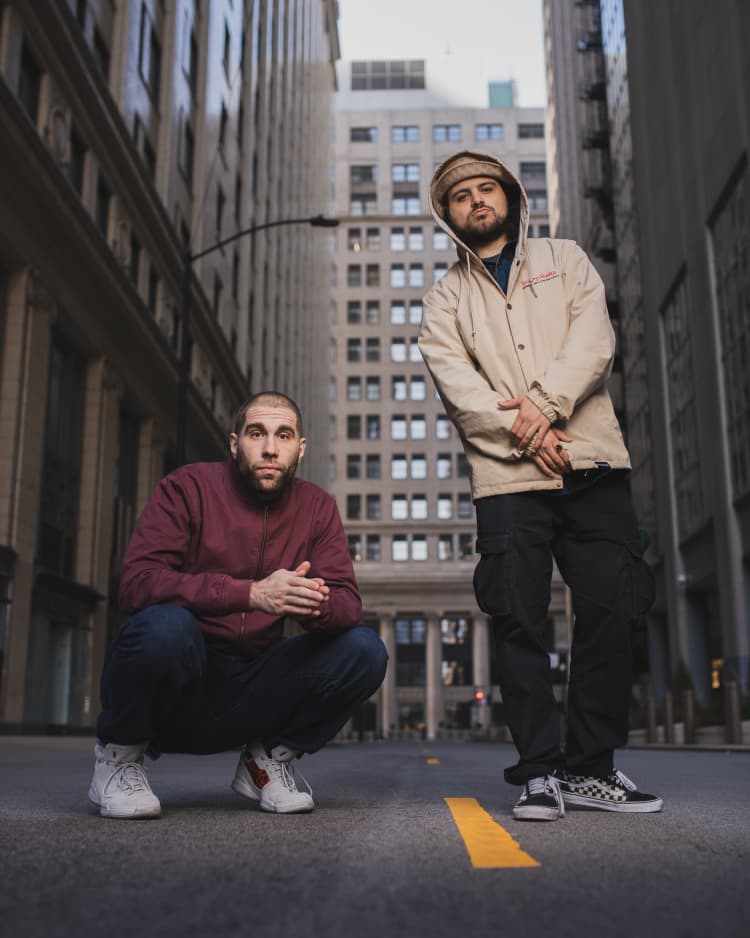Defcee’s new album forgives but doesn’t forget
For All Debts Public and Private, premiering today with The FADER, is produced by BoatHouse and features contributions from Armand Hammer and more.

Adam Levin (Defcee) has been grinding toward a rap career since his teenage years. He started out in the Young Chicago Authors program, making his rounds at open mics across the city, crossing paths with generational talents such as Chance the Rapper, Noname, and Mick Jenkins, and eventually running his own rap and poetry workshops with the program. As an adult, he dove into education, working as a public school teacher on the city's East Side and giving classes in prisons, always using hip-hop as a vehicle for knowledge. Last year, he caught his first major break when billy woods' Backwoodz Studios released his last album, Trapdoor. He also became a father recently, and though he'd spent much of his career with a chip on his shoulder — feeling both owed and unworthy of hip-hop status — these new developments helped him put these insecurities in perspective.
This paradigm shift is the basis of Levin's new album, For All Debts Public and Private, premiering today with The FADER and out tomorrow via Closed Sessions. Produced by midwest mainstay BoatHouse, it features billy woods and ELUCID (Armand Hammer), as well as SolarFive, greenSLLLIME, Kipp Stone, and Mother Nature. The record takes a decidedly old-school approach — boom-bap beats and an emphasis on lyrics and flow — but rarely feels stuck in the past.
Listen to an exclusive stream of For All Debts Public and Private, and read Levin's interview with The FADER, below.
Defcee Q&A
The FADER: Tell me about coming up in the Chicago open mic scene. What were some memorable performances you saw and life-changing moments from that time in your career?
Defcee: There are too many to be able to comprehensively list here, but definitely learning about, meeting, and forming very good relationships with rappers I admired from the city — legends like SKECH185, Jyroscope, Lamon Manuel, Ang13, Wizard Jenkins the Great, Gilead 7, Decay, and Malakh El. Being able to call them friends and mentors is pretty surreal, as is the fact that the open mics I attended a decade ago would cost a lot of money to see at a festival now — Noname, Saba, Joseph Chilliams, Jean Deaux, MFnMelo, FrshWaters, Nico Segal, Chance, Vic Mensa, and Lucki were performing in front of me as kids and really making me step my game up as far as how often I made music and how different my expectations needed to be in order to keep music a fulfilling and worthwhile pursuit.
Tell me about teaching through hip-hop in Chicago Public Schools and prisons. It sounds like something that has the potential to be very effective but could also come off as patronizing, coming from a white man.
Something I had to stop doing was behaving as if my opinion on rap music was more informed than someone else's just because I felt that I had a more "intellectual" appreciation of the craft, and that was one of the most patronizing parts of my playing out the stereotype of the white hip-hop head. I stopped trying to prove how much I knew about rap to the kids, who were there to express themselves in a non-judgmental space while still pushing themselves and one another to improve with what they were making. I became less of a teacher and more of a student when it came to music, and I didn't question the authenticity of the experiences the students described in their lyrics, or shared during the workshops. Even if I'm facilitating a rap workshop — or co-facilitating a rap workshop with Add-2, who's an excellent educator and mentor in addition to being one of the most gifted rappers alive — I'll never be the most knowledgeable person in the room when it comes to hip-hop culture and the Black and Brown communities which invented it. As white rappers and fans, we have to be humble, because we are guests in a home that we haven't built, and we have to be cognizant and respectful of that.
The new album seems to be reckoning with some unhealthy thought patterns you used to have. Was the process of making it in some ways therapeutic?
I started writing raps for fun when I was in the sixth grade, and it eventually became a healthy outlet for some pretty difficult emotional issues I had. So the process of making this album was definitely therapeutic, but not more so than any of my past projects — in fact, I'd argue it's less cathartic than anything I released in 2021. On songs like "Moving Targets," though, it's therapeutic to own up to ways in which I've let resentment and envy guide how I moved through life and handle my relationships with others, as well as a way to transparently try to get everyone in Chicago rap on the same page so we can build way more often than we destroy. Songs like "QTNA" are therapeutic in that I have always been terrible with money, which is something that has caused myself and people I care about a lot of distress and discomfort. It's therapeutic to be honest about things like that in the same public spaces where I'm asserting any kind of authority as a rapper or a mentor — that ultimately, I am flawed in ways I have to be up front about if I want people to take the perspectives I share in my music seriously. I'm not about to be either the hero or the victim in every story I tell about myself, and I hope I can lead others to do the same in their art with that example.




